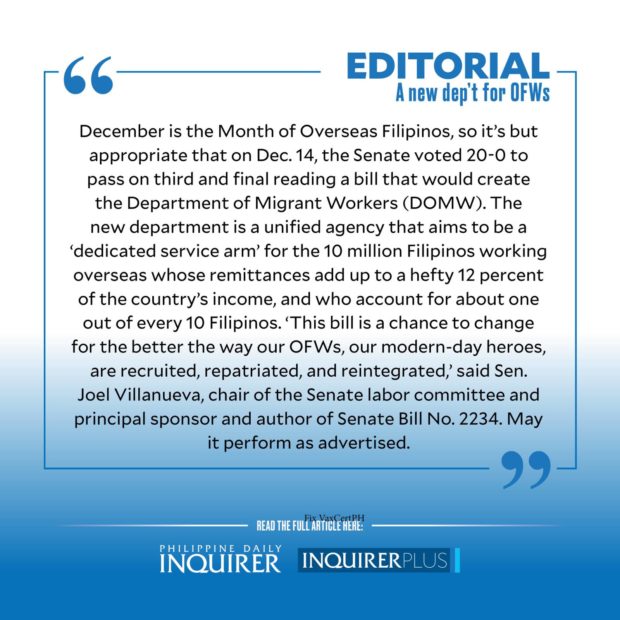A new department for OFWs

December is the Month of Overseas Filipinos, so it’s but appropriate that on Dec. 14, the Senate voted 20-0 to pass on third and final reading a bill that would create the Department of Migrant Workers (DOMW). The new department is a unified agency that aims to be a “dedicated service arm” for the 10 million Filipinos working overseas whose remittances add up to a hefty 12 percent of the country’s income, and who account for about one out of every 10 Filipinos.
“This moment is for every Filipino abroad who has sacrificed so much for their family and our beloved country,” said Sen. Joel Villanueva, chair of the Senate labor committee and principal sponsor and author of Senate Bill No. 2234. “This bill is a chance to change for the better the way our OFWs, our modern-day heroes, are recruited, repatriated, and reintegrated.”
Once signed into law — fulfilling one of President Duterte’s campaign promises in 2016 — the new department is mandated to orchestrate all efforts and policies to protect OFWs. With the Philippine Overseas Employment Administration serving as the backbone, the department will also merge six other offices currently under other departments, including the Office of the Undersecretary for Migrant Workers’ Affairs under the Department of Foreign Affairs and the Office of the Social Welfare Attaché under the Department of Social Welfare and Development. The Overseas Workers Welfare Administration, meanwhile, will be an attached agency of the DOMW.
The one-stop shop for OFWs, created in response to longstanding complaints that agencies mandated to serve them were scattered across different offices and departments, will be provided an initial funding of P1.1 billion. Once operational, the DOMW is expected to address longstanding issues affecting OFWs such as costly red tape, festering illegal recruitment, and safe and timely repatriation especially during times of strife and global crisis. At the height of the COVID-19 pandemic, some 800,000 OFWs had to be sent home as companies across the globe shed workers to survive the economic crunch.
The new department will also coordinate with the Inter-Agency Council Against Trafficking and the Department of Justice to “investigate, initiate, sue, pursue, and help prosecute” cases involving illegal recruitment and human trafficking. Decades of the country’s labor-export policy has also bred a stubborn industry of illegal recruitment, with workers deceived about the nature of their jobs and given wages that are less than what is promised. In many cases, the criminal racket is helped along by fixers and operators inside the government bureaucracy.
This time, with the service agencies now housed under a single department, OFWs and their families have every right to expect that the government’s services toward the sector would see significant improvement. Villanueva vows that the DOMW will not just be a department in name, formed only by the mere transfer of units from other line agencies: “Hindi po basta ‘lipat-bahay’ o ‘pagpapalit ng karatula ng pangalan’ ang itinatayo nating kagawaran kundi isang ‘bagong bahay’ na may maayos na plano at base sa pangarap at adhikain ng mga mismong may-ari ng bahay na ito, wala pong iba kundi ang ating mga Overseas Filipino Workers.”
Even with the lingering pandemic, many OFWs who were forced to return home are eager to resume their employment abroad, given the economic downturn in the country that has seen record joblessness and poverty. As the ranks of such migrant workers continue to increase season after season, government policies and regulations have not been able to keep up. It was only last November, for instance, that the Department of Labor and Employment launched what it called the “National Action Plan to Mainstream Fair and Ethical Recruitment,” which seeks to decisively address the problem of illegal and unfair recruitment practices that have ruined lives as well as bankrupted many Filipino families—most of them already poor to begin with and desperate for better job prospects overseas—targeted by recruitment syndicates.
Per Villanueva, about 6,100 Filipinos went abroad every day for jobs abroad before the COVID-19 pandemic halted hirings. This diaspora translates to Filipinos accounting for at least 5 percent of all migrant workers globally, making the Philippines the seventh in terms of deployment of citizens for foreign jobs and one of the world’s top senders of money back home. And yet, “despite their contributions to our economy and the love and respect they get from other countries and nationalities, problems continue to plague our overseas Filipinos, especially OFWs,” said Villanueva.
The DOMW is being touted as a Christmas gift this year for the country’s modern-day heroes. May it perform as advertised.

















